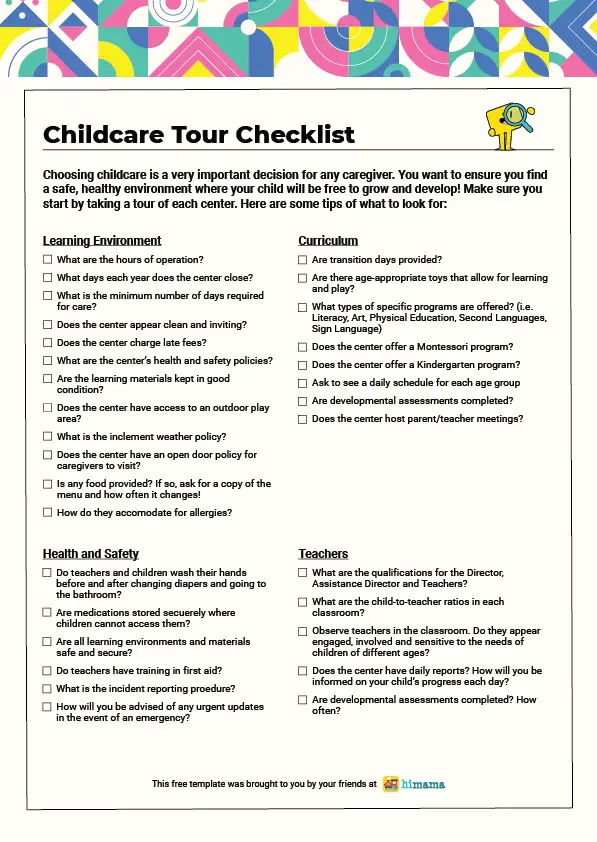For many parents, choosing childcare is one of the most important and daunting decisions they’ll make. Whether you’re returning to work or seeking additional support for your child’s development, finding the right childcare provider can have a significant impact on your family’s well-being. But with so many options available, how do you know which one is the best fit for your child and your family? In this comprehensive guide, we’ll walk you through everything you need to consider to make an informed decision about childcare.

- Assess Your Needs: Before diving into your childcare search, take some time to assess your family’s needs and preferences. Consider factors such as your work schedule, budget, location, and your child’s age, personality, and developmental needs. Are you looking for full-time care, part-time care, or occasional babysitting? Do you prefer a childcare center, a home daycare, or a nanny? Identifying your priorities will help narrow down your options and guide your decision-making process.
- Research Your Options: Once you have a clear understanding of your needs, it’s time to research childcare options in your area. Ask for recommendations from friends, family members, and other parents in your community. Explore online resources, such as childcare directories and review websites, to learn more about local childcare providers and their reputations. Take note of important factors such as licensing, accreditation, safety protocols, and staff qualifications.
- Visit and Interview Potential Providers: After compiling a list of potential childcare providers, schedule visits to each facility or arrange interviews with individual caregivers. During your visit or interview, observe the environment, interact with the staff, and ask questions about their philosophy, curriculum, daily routines, and policies. Pay attention to the cleanliness, safety, and organization of the facility, as well as the interactions between caregivers and children. Trust your instincts and ask yourself if you feel comfortable and confident entrusting your child to their care.
- Consider Your Child’s Needs and Preferences: When choosing childcare, it’s essential to consider your child’s unique needs, personality, and preferences. Some children thrive in structured environments with a predictable routine, while others may prefer more flexibility and individualized attention. Take your child’s temperament, interests, and developmental stage into account when evaluating potential childcare options. Consider how well the program or provider aligns with your child’s interests, learning style, and social-emotional needs.
- Evaluate Affordability and Accessibility: Affordability and accessibility are critical factors to consider when choosing childcare. Evaluate the cost of tuition or fees, as well as any additional expenses such as transportation, meals, and supplies. Consider whether the childcare provider offers financial assistance or flexible payment options to accommodate your budget. Additionally, assess the location and hours of operation to ensure that the childcare arrangement is convenient and feasible for your family’s schedule.
- Trust Your Instincts: Above all, trust your instincts when making a decision about childcare. Pay attention to how you feel when visiting or interacting with potential providers. Do you feel confident in their ability to care for your child? Do you trust their judgment and values? Remember that you know your child best, and ultimately, you are the best judge of what is right for your family.
Daycare or Nanny: What is the best choice for your family?
Choosing childcare is a significant decision that requires careful consideration and research. By assessing your family’s needs, researching your options, visiting potential providers, considering your child’s preferences, evaluating affordability and accessibility, and trusting your instincts, you can make an informed decision that meets your child’s needs and gives you peace of mind as a parent.
Handling Challenges: What to Do If You Encounter Issues with Your Childcare Provider
While finding the right childcare provider is crucial, sometimes challenges may arise even after careful consideration and selection. Here are some strategies for resolving issues and ensuring the well-being of your child.
- Establish Open Communication: In the event of any concerns or issues with your childcare provider, it’s crucial to establish open and honest communication. Schedule a meeting or phone call to discuss your concerns directly with the provider or management team. Clearly articulate your concerns, listen to their perspective, and work together to find a solution that addresses the issue effectively.
- Document and Document: Keep detailed records of any incidents, conversations, or agreements related to the issue at hand. Documenting your interactions with the childcare provider can provide clarity and accountability if further action is necessary. Keep copies of emails, notes from meetings, and any other relevant documentation to support your case.
- Seek Mediation or Assistance: If attempts to resolve the issue directly with the childcare provider are unsuccessful, consider seeking mediation or assistance from a neutral third party. Contact local childcare resource and referral agencies, licensing authorities, or professional organizations for guidance and support. They may offer mediation services or resources to help resolve conflicts and address concerns.
- Know Your Rights: Familiarize yourself with your rights as a parent and the responsibilities of childcare providers under local regulations and licensing standards. If the provider is in violation of any regulations or has breached your contract, you may have legal recourse to address the issue. Consult with a lawyer or legal advisor to explore your options and determine the best course of action.
- Consider Alternative Arrangements: If the issues with the childcare provider cannot be resolved satisfactorily, consider exploring alternative childcare arrangements. Research other providers or programs in your area that may better meet your needs and preferences. While transitioning to a new childcare arrangement can be challenging, prioritizing your child’s safety and well-being is paramount.
- Advocate for Change: If you encounter systemic issues or concerns that affect multiple families, consider advocating for change within the childcare community. Join parent advocacy groups, participate in community forums, and voice your concerns to local policymakers and stakeholders. By working together with other parents and advocates, you can effect positive change and improve the quality of childcare for all families.
Choosing childcare is a significant decision that can have a profound impact on your child’s development and your family’s well-being. By carefully assessing your needs, researching your options, and trusting your instincts, you can make an informed decision that meets your child’s needs and gives you peace of mind as a parent. However, it’s essential to remember that challenges may arise even after selecting a childcare provider. In such cases, it’s important to communicate openly, address concerns promptly, and advocate for your child’s safety and well-being. By following the strategies outlined in this guide and seeking support when needed, you can navigate any difficulties that arise and ensure that your child receives the quality care they deserve. Remember, you’re not alone in this journey, and with patience, persistence, and proactive communication, you can find a childcare solution that works for your family.









